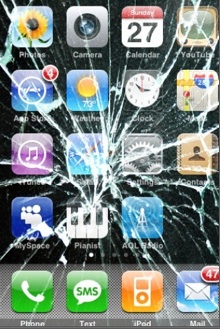
Right about now, Apple probably wishes it had never rejected Google Voice and related apps from the iPhone. Or maybe it was AT&T who rejected the apps. Nobody really knows. But the FCC launched an investigation last night to find out, sending letters to all three companies (Apple, AT&T, and Google) asking them to explain exactly what happened.
On its face, it might seem odd to some people that the FCC is investigating the rejection of a single iPhone app. After all, iPhone apps are rejected every day. But the Google Voice rejection caused an unusual amount of uproar, and there is nothing like a high-profile case to make an example out of in pursuit of pushing a bigger policy agenda. The FCC investigation is not just about the arbitrary rejection of a single app. It is the FCC’s way of putting a stake in the ground for making the wireless networks controlled by cell phone carriers as open as the Internet.
Today there are two different sets of rules for applications and devices on the Internet. On the wired Internet, we can connect any type of PC or other computing device and use any applications we want on those devices. On the wireless Internet controlled by cellular carriers like AT&T, we can only use the phones they allow on their networks and can only use the applications they approve. This was fine when the wireless networks were used mostly just for voice calls. But now that they are increasingly becoming our mobile connections to the Internet and mobile phones are becoming full-fledged mobile computers, an argument has been growing that the same rules of open access that rule the wired Internet should apply to the wireless Internet.
While Apple and AT&T cannot be too happy about the FCC investigation, Google must secretly be pleased as punch. It was only two years ago, prior to the 700MHz wireless spectrum auctions, that it was pleading with the FCC to adopt principles guaranteeing open access for applications, devices, services, and other networks. Now two years later, in a different context and under a different administration, the FCC is pushing for the same principles.
In its letters requesting more information from all three companies, the FCC cites “pending FCC proceedings regarding wireless open access (RM-11361) and handset exclusivity (RM-11497). That first proceeding on open access dates back to 2007 when Skype requested that cell phone carriers open up their networks to all applications (see Skype’s petition here). Like Google Voice, Skype helps consumers bypass the carriers. The carriers don’t like that because it erodes their core business and turns them into dumb pipes.
But dumb pipes are what we need. They are good for consumers and good for competition because they allow any application and any device, within reason, to flower on the wireless Internet. So if you look at the questions the FCC is asking, it wants to know why the Google Voice app was rejected and whether AT&T (the carrier) had anything to do with that rejection:
2. Did Apple act alone, or in consultation with AT&T, in deciding to reject the Google Voice application and related applications? . . .
3. Does AT&T have any role in the approval of iPhone applications generally (or in certain cases)? If so, under what circumstances, and what role does it play?
The FCC also wants Apple to explain the arbitrariness of its app approval process:
4. Please explain any differences between the Google Voice iPhone application and any Voice over Internet Protocol (VoIP) applications that Apple has approved for the iPhone. Are any of the approved VoIP applications allowed to operate on AT&T’s 3G network?
5. What other applications have been rejected for use on the iPhone and for what reasons? Is there a list of prohibited applications or of categories of applications that is provided to potential vendors/developers? If so, is this posted on the iTunes website or otherwise disclosed to consumers?
6. What are the standards for considering and approving iPhone applications? What is the approval process for such applications (timing, reasons for rejection, appeal process, etc.)? What is the percentage of applications that are rejected? What are the major reasons for rejecting an application?
Good questions. Hopefully, the FCC will share Apple’s answers with the rest of the us. It is all a bit absurd, though. Why does it take a formal request from a government agency to get Apple (and AT&T) to explain what the rules are to get on the wireless Internet? More importantly, why are these companies allowed to be the gatekeepers to the wireless Internet? The iPhone needs to be smashed open, and the FCC is swinging the hammer.
Update: AT&T responded to this post with the following statements:
AT&T does not manage or approve applications for the App Store. We have received the letter and will, of course, respond to it.
Customers can use any compatible GSM phone on our network, not just the ones we’ve approved and sell. And they also can use apps we don’t approve. We don’t approve iPhone applications.
So there you have it. You can use any mobile app you like on AT&T—unless it is an iPhone app (that’s been rejected by Apple). Does Apple ever reject apps at the request of AT&T though? Maybe they’ll give the FCC a straight answer.
(Flickr photo credit:Stephen Heywood).